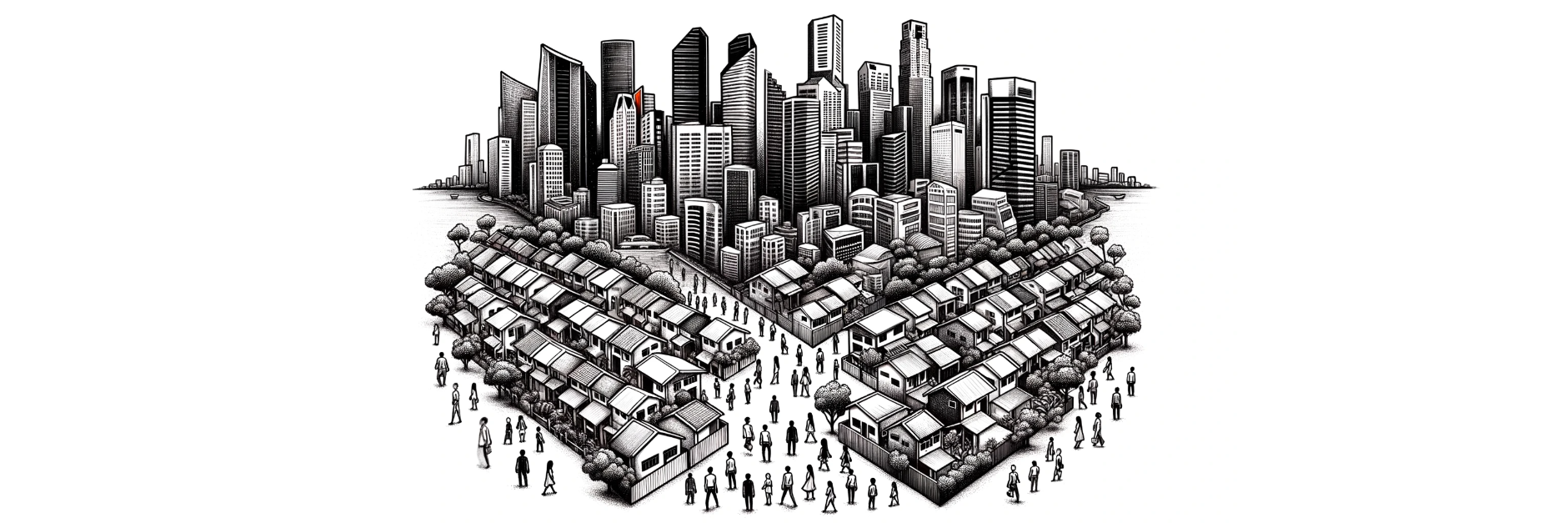What does Inequality Looks Like in Singapore?
Have you ever caught yourself pondering the undercurrents of our society, beyond the sparkling facades of prosperity? Well, I recently dived into Teo You Yenn’s “This Is What Inequality Looks Like” after hearing her speak in a recent podcast and it has been nothing short of a revelation for me. This book isn’t just making rounds in academic circles; it was also referenced in in Parliament by Nominated Member of Parliament Kuik Shiao-Yin in her speech about income inequality in Singapore.1
Every week, I’ll be sharing practical tips and invaluable knowledge to guide you on your path to financial independence.
Understanding the Essence of the Book
What is this book all about? In this book, you will dive into a deep, insightful journey into the lives of low-income families in Singapore, a side of our society that often goes unnoticed. Teo You Yenn, the brilliant mind behind this work, isn’t just your regular author. She’s an Associate Professor and Provost’s Chair in Sociology at Nanyang Technological University, Singapore and she knows her stuff. Over three years, she dove into the heart of low-income residential areas, engaging in over 200 interviews. But here’s the kicker – she didn’t go the typical survey or structured interview route. No, she chose to have casual conversations instead, the kind that lets people open up more naturally. This approach paints a real, raw picture of the lives and struggles of these families.
Now, why is this important, you ask? It’s simple. Teo’s book challenges us to look beyond the surface, to understand that there’s more to our society than the shiny, prosperous image we often see. It’s about lifting the veil and seeing the reality of inequality that exists right under our noses.
Key Insights and Learnings
This book hits hard with some pretty crucial concepts. One that really stuck with me is ‘differentiated deservingness’. It’s a term Teo uses to describe how public support isn’t the same for everyone in Singapore. Your income, your lifestyle, it all plays a part. And here’s where it gets interesting: this idea throws a curveball at our belief in meritocracy. We like to think everyone gets a fair shot in the game of life, but Teo shows us that’s not always the case. It’s a bit like not everyone starting at the same line in a race. Some start way ahead, and others are left trying to catch up.
But it’s not just about throwing facts and figures at you. Teo brings these issues to life with stories, real experiences of people living these inequalities. It’s these stories that stick with you, that make you see the familiar streets of Singapore in a different light.
Implications for Singaporean Society and Policy
This book isn’t just a passive read; it’s a catalyst for conversation and, hopefully, change. It’s gotten people talking, and for good reason. Teo isn’t just pointing out problems; she’s urging us to shift how we think about success, privilege, and inequality. It’s about looking beyond just handing out financial aid. We need to change the stories we tell ourselves about what’s ‘normal’ and ‘deserved’.
Why is this so crucial? Because it affects how we shape our policies, how we address the needs of different segments of our society. It’s about creating a Singapore where everyone truly has a fair chance, not just in theory, but in practice.
The book reflects the reality of Singapore today
In one of our mainstream tabloid, a Singaporean mother of 3 has recently posted a video about her perspective of how her household needs about $30,000 to $40,000 a month to raise her 3 children. The expenses include living in a condominium, owning a car, children education, and allowing her children the option to pick up a hobby should they wish.
Prior to reading this book, I would think that this Singaporean mother should spend within her means and reduce her household budget and her family’s lifestyle to reduce stress on earning a higher income. But after reading this book, I find that I can relate better to where she’s coming from. She is simply trying her best to give her children the life and upbringing that allows them to start the meritocracy game ahead of their peers. Nobody should fault a mother who wants the best for her children.
Why This Book is Crucial for Singaporeans
So, why should you, sitting there with your cup of coffee, care about this book? It’s pretty straightforward. “This Is What Inequality Looks Like” opens our eyes. It’s a wake-up call to acknowledge and understand the different layers and facets of our society. It’s an invitation to rethink the narrative of meritocracy in Singapore.
Reading this book, you begin to understand that inequality isn’t just someone else’s problem. It’s a part of our society, our community, and it affects us all in one way or another. It’s about empathy, understanding, and taking action.
Conclusion: The Monopoly of Life – A Reflection on Meritocracy
Let me leave you with this thought. Imagine life as a game of Monopoly, except not everyone starts playing the game with the same amount of money, and some may even have properties on the board right from the start. That’s an epiphany I got from Teo’s book about meritocracy in Singapore. It’s not just about having the opportunity to play; it’s about recognizing that not everyone starts from the same place or with the same resources.
“This Is What Inequality Looks Like” is more than a book; it’s a mirror reflecting our society. It urges us to empathize with those who had less at the start and to work towards making the game fair for everyone. It’s a must-read for anyone who wants to understand the less visible aspects of life in Singapore, and it’s a call to action to change the rules of the game.
So, let’s not just play the game. Let’s work to change it, for everyone’s sake. Happy reading, and here’s to a more inclusive and understanding Singapore!


